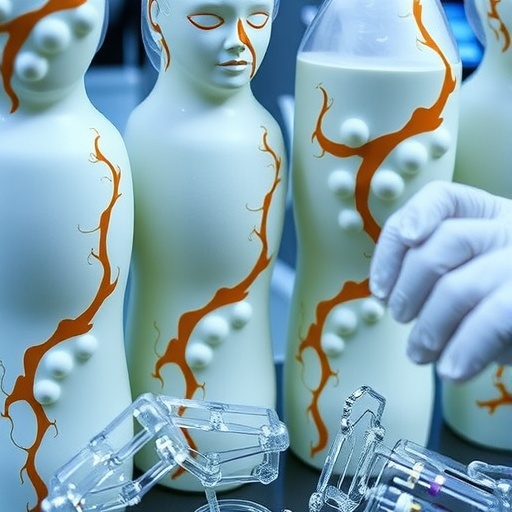In a groundbreaking study that promises to reshape our understanding of gastrointestinal health, researchers have unveiled the remarkable effects of a specific gut bacterium, Ruminococcus torques. This research, spearheaded by Lou et al., investigates the intricate relationship between gut microbiota, bile acid metabolism, and the chronic afflictions of inflammatory bowel disease (IBD). The study, published in the Journal of Translational Medicine, reveals that Ruminococcus torques has the potential to ameliorate pathological inflammation and enhance gut barrier function, presenting exciting prospects for therapeutic interventions in IBD.
The backdrop of this research is rooted in the mounting prevalence of inflammatory bowel disease worldwide. IBD, encompassing Crohn’s disease and ulcerative colitis, is characterized by chronic inflammation of the gastrointestinal tract, leading to debilitating symptoms and a profound impact on the quality of life for those affected. Current treatments often provide only marginal relief and are accompanied by a range of side effects, underscoring the urgent need for novel therapeutic strategies. The researchers aimed to explore the role of gut microbiota in IBD, particularly the potential beneficial effects of specific bacterial strains, including Ruminococcus torques.
Ruminococcus torques, a member of the Firmicutes phylum, has garnered attention for its unique metabolic capabilities. Previous studies have suggested that certain gut bacteria can influence the host’s immune responses and epithelial integrity. Lou et al. set out to investigate whether Ruminococcus torques could modulate inflammatory responses and restore gut barrier function in the context of IBD. By employing various experimental models, the researchers meticulously examined the bacterium’s interactions within the gut environment and its effects on host health.
The experimental design of the study involved administering Ruminococcus torques to animal models suffering from induced IBD. The researchers meticulously monitored clinical parameters, histological changes, and markers of inflammation throughout the duration of the experiment. Remarkably, the results indicated a significant reduction in inflammatory markers and an improvement in the gut barrier’s integrity following treatment with Ruminococcus torques. These findings provide compelling evidence of the bacterium’s therapeutic potential and its role in modulating the gut microbiome.
A critical aspect of this research revolved around understanding how Ruminococcus torques influenced bile acid metabolism, a crucial component of digestive health. Bile acids, produced by the liver and stored in the gallbladder, play a pivotal role in the emulsification of fats and the absorption of fat-soluble vitamins. Emerging evidence suggests that alterations in bile acid profiles can significantly impact gut microbiota composition and may contribute to inflammatory processes. Lou et al. elucidated the mechanisms through which Ruminococcus torques interacted with bile acids, revealing a complex interplay that underscores its role in maintaining gut homeostasis.
Furthermore, the researchers conducted comprehensive analyses of the gut microbiota composition in both treated and untreated models. Utilizing advanced sequencing techniques, they identified shifts in microbial populations that correlated with the administration of Ruminococcus torques. Notably, a decrease in harmful bacteria associated with IBD and an expansion of beneficial microbial taxa were observed, highlighting the bacterium’s ability to restore microbial balance within the gut ecosystem.
The implications of these findings extend beyond the immediate context of IBD treatment. By demonstrating that Ruminococcus torques can positively influence gut microbiota and enhance gut barrier function, the research opens up new avenues for exploring its potential applications in various gastrointestinal disorders. As antibiotic resistance continues to challenge conventional treatment protocols, harnessing the power of beneficial bacteria may provide a more sustainable and effective approach to managing chronic gut conditions.
While the study lays a strong foundation for further exploration, it also raises critical questions regarding the long-term effects of Ruminococcus torques supplementation. The safety profile of this bacterium, particularly for individuals with pre-existing health conditions, remains to be thoroughly assessed. Additionally, understanding the dose-response relationship and the optimal duration of treatment will be essential for translating these findings into clinical practice.
As researchers continue to unravel the complexities of the gut microbiome, the promise of personalized approaches to treating IBD and other gastrointestinal disorders becomes increasingly feasible. The ability to modulate the microbiome through targeted interventions could potentially revolutionize the management of these chronic conditions, offering patients a more effective and personalized treatment path.
In conclusion, Lou et al.’s study highlights the therapeutic potential of Ruminococcus torques in ameliorating inflammatory bowel disease and restoring gut barrier function. By modulating gut microbiota and bile acid metabolism, this bacterium emerges as a promising candidate for future therapeutic strategies. As the scientific community delves deeper into the intricate world of gut health, the findings presented in this research could pave the way for novel approaches to combat IBD and enhance overall gastrointestinal well-being.
The path forward will undoubtedly involve rigorous clinical trials to validate the efficacy and safety of Ruminococcus torques in human populations. Additionally, collaboration between researchers, clinicians, and industry stakeholders will be crucial in translating these findings into practical applications. As we stand at the forefront of microbiome research, the journey towards harnessing the power of beneficial bacteria in human health has only just begun.
Through continued exploration and innovative approaches, we may be able to unlock the secrets of our gut microbiota and revolutionize the way we think about gut health, leading to improved therapies and enhanced quality of life for individuals afflicted with inflammatory bowel disease and beyond.
Subject of Research: The effects of Ruminococcus torques on inflammatory bowel disease and gut microbiota.
Article Title: Ruminococcus torques ameliorates the inflammation bowel disease and gut barrier dysfunction by modulating gut microbiota and bile acid metabolism.
Article References: Lou, Y., Lv, Y., Wang, X. et al. Ruminococcus torques ameliorates the inflammation bowel disease and gut barrier dysfunction by modulating gut microbiota and bile acid metabolism. J Transl Med 23, 1162 (2025). https://doi.org/10.1186/s12967-025-07192-w
Image Credits: AI Generated
DOI:
Keywords: Ruminococcus torques, inflammatory bowel disease, gut microbiota, bile acid metabolism.




